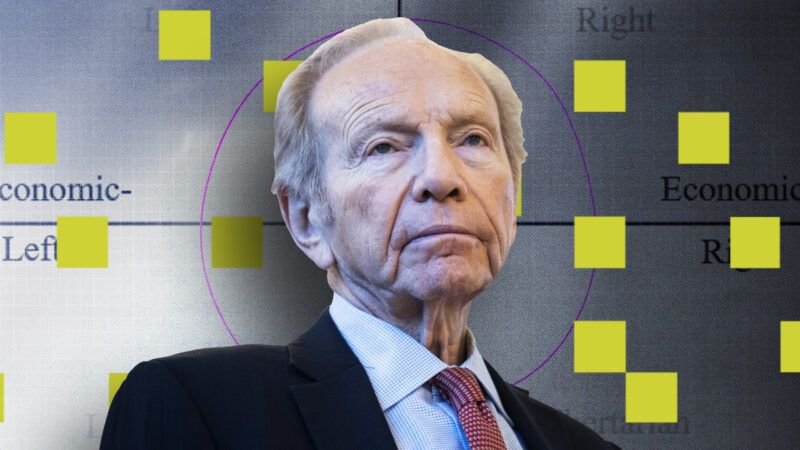No Labels, With No Candidate, Says Yes to a 2024 Presidential Campaign
The 14-year-old nonprofit is about to find out whether third-party politics has a centrist/establishment lane.

No Labels says it's about to jump into the 2024 presidential race.
A day prior to a secret delegate meeting that's not a convention, the centrist nonprofit that isn't a political party indicated Thursday that the members whom it won't name are almost certainly going to agree with the backers it refuses to disclose that a non-existent unity ticket to be chosen via undetermined process should nonetheless be green-lit to enter a presidential contest that No Labels swears it can plausibly win and definitely not tip to Donald Trump.
"We expect our delegates to encourage the process to continue," No Labels Chief Strategist Ryan Clancy told The Wall Street Journal.
The Joe Lieberman–chaired organization remains convinced, all contrary evidence notwithstanding, that what disgruntled voters most crave as an alternative to Beltway politics as usual is a centrist coalition of establishment office-holders who can out-hawk both major parties on foreign policy.
"The far left wants to abandon Israel," former Dallas Mayor Mike Rawlings warned in an awkward March 5 No Labels State of the Union prebuttal that had 2,600 views in its first two days on YouTube. "And the far right wants to abandon Ukraine."
Is Rawlings a potential candidate to leverage No Labels' ballot access, currently tabulated at 16 states plus the District of Columbia on the way to a projected 32 (with the eventual candidate expected to go after the remaining 19)? Who knows!
"The right candidate is out there," group founder Nancy Jacobson insisted in The Dallas Morning News on February 29. "That's the last piece we need."
What we do know is that the list of politicians rebuffing No Labels' advances grows almost as fast as the organization floating candidate names to the press: former Maryland Gov. Larry Hogan, Sen. Joe Manchin (D–W.Va.), vanquished Republican contender Nikki Haley, and steamrolled Biden-challenger Dean Phillips (D–Minn.).
On Thursday afternoon, The Wall Street Journal reported that "One candidate the group is interested in, according to a person familiar with its discussions, is Sen. Kyrsten Sinema (I., Ariz.), a former Democrat who said this week that she wouldn't run for re-election." Less than three hours later, Sinema ruled it out.
Why wouldn't a brand-name politician jump at the chance to mount a longshot entry into a polarized, razor-thin White House race? Besides the persuasive cooing of good cops (like Bill Clinton) and out-and-out threats from bad cops like the Lincoln Project ("If you have one fingernail clipping of a skeleton in your closet, we will find it…We are going to come at you with every gun we can possibly find"), there is the cruelty of electoral math.
Manchin, one of the best-known names associated with the organization, appeared in presidential polls in December and January. The showing both times: 3 percent.
Third Way, a center-left think tank playing point on anti–No Labels agitation, released a national poll Thursday testing a name-recognition best-case scenario for the unity ticket, Nikki Haley and Dean Phillips. The duo came in fourth place in a four-way race, at 9 percent, behind Robert F. Kennedy Jr.'s 13 percent.
Now imagine that instead of a high-profile former governor and United Nations ambassador who had been campaigning for the past year, you had at the top of the ticket one of the last whispered names that hasn't yet said no, like…former Tennessee Gov. Bill Haslam. Brutal.
For nine years running, the establishment centrist hawkish lane for presidential politics inside the GOP has been narrow and littered with bones, from Haley's to Bill Weld's all the way back to Jeb Bush's. Attempts to assemble a new "common sense" coalition in the patriotic center—Evan McMullin, Howard Schultz, Michael Bloomberg—have largely exploded on the launch pad in a conflagration of dollar bills.
While I may prefer this category's comparative sobriety and willingness to prioritize the long-dead project of tackling America's looming entitlements catastrophe, a decent respect for the opinions of the electorate requires facing that voters just aren't into stentorian Problem Solvers who fret that Washington isn't interventionist enough. And those voters who do finally break free of the two-party grip tend to gravitate toward candidates, issues, and parties that represent a clean break from the recognizable Washington past.
Though No Labels, ever opportunistic on public relations, is expected to formally announce after today's post–Super Tuesday Zoom call that the organization is finally in it to win it, one of its officials' many contradictory quotes about the quest gives a possible future way out.
"If the rank and file of No Labels says to us tomorrow, 'Go for it,'" Lieberman told Newsmax Thursday, "we'll do some last polling to see whether we can actually win, and then we'll choose the best ticket we can."
It's hard to imagine even the most skilled masseuse making any such poll numbers look viable. But the underlying political weirdness of 2024 has yet to manifest in the presidential campaign, and you should never underestimate the intoxicating force of visualizing oneself at the vanguard of power.


Show Comments (50)